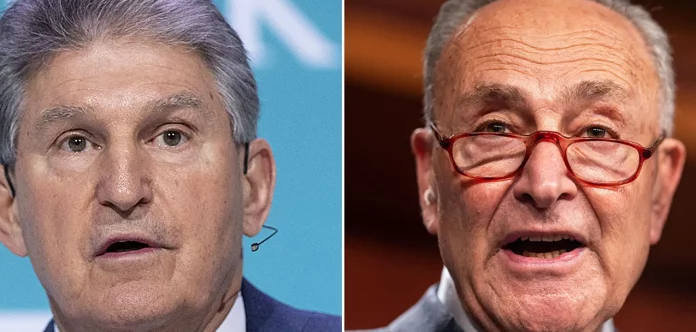Only a small portion of Joe Manchin’s campaign funds came from his home state of West Virginia. Corporate donations and out-of-state contributions make up the majority of his fundraising. According to Federal Elections Commission filings, Manchin shocked Washington by announcing an agreement for the Inflation Reduction Act to promote green energy and pharmaceutical spending. He received $6.1 million in donations from individuals who contributed more than $200 to his campaign between January 2021 – June 30, 2022.
Only $65,000 of the total donations were made by West Virginia residents, while $6 million was donated from people in other states. Manchin also received $176,000 in small-dollar donations. However, it is not clear how much came from West Virginia residents since campaigns don’t have to report information about donors for contributions less than $200.
Manchin will not be up for reelection until 2024, and he hasn’t announced whether he will run again in the Senate. Manchin’s office didn’t immediately respond to a request.
Manchin, D-N.Y., announced the Inflation Reduction Act as an agreement with Senate Majority leader Chuck Schumer. It includes $433 billion in new spending for green energy programs and expanded Affordable Healthcare Act benefits. $739 billion would be needed to pay for the new spending. This could be done by increasing corporate taxes and enforcing stricter IRS regulations. Democrats insist that the bill will lower inflation by reducing the deficit with the balance of the extra revenue.
To pass the Senate before August recess, the bill must overcome many hurdles. This includes ensuring that all 50 Democrats can vote in Washington. Kyrsten Sinema (D-Ariz.), has not yet indicated whether she will vote for the bill. Sinema, Manchin and other factors were key to the failure of President Biden’s massive Build Back Better spending plans in his first year.
Manchin supported the bill because it included large payments for green electricity grants and programs. This is partly due to other provisions that could be beneficial for West Virginia energy production.
For example, the bill contains provisions that will streamline natural gas pipeline production. Rep. Alex Mooney (R-W.Va.) criticized the bill for “raising taxes on West Virginia’s coal mining industry and giving subsides to liberals from deep blue states to use electric vehicles”. He wrote this in a local newspaper column last Wednesday.
Politico was told by Senator Shelley Moore Capito (R-W.Va.) that Manchin would struggle to convince his voters that the bill is good news for West Virginia.
Republicans have criticised Manchin’s willingness to compromise with Biden’s political agenda, despite his opposition to the Build Back Better plans. Some believe he will face a difficult path to reelection if elected again.
Politico reported that Sen. John Barrasso (Republican from Wyoming) said Manchin’s seat would become a target for the GOP in 2024.


